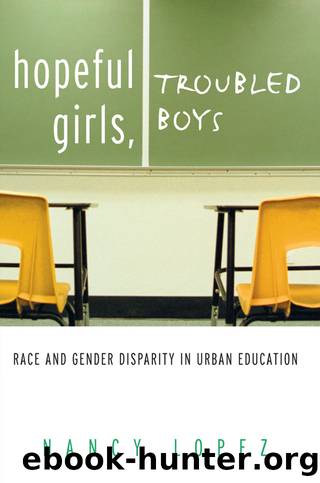Hopeful Girls, Troubled Boys by Nancy Lopez

Author:Nancy Lopez [Lopez, Nancy]
Language: eng
Format: epub
Tags: Social Science, Sociology, General, Discrimination, Gender Studies
ISBN: 9781000143461
Google: YAPzDwAAQBAJ
Barnesnoble:
Goodreads: 474212
Publisher: Routledge
Published: 2002-12-13T00:00:00+00:00
Teachers' Staff Development Day
At UHS, teachersâ uneasiness over the introduction of the new Regents requirements for graduation was palpable during the day-long staff development workshop. I walked into the morning plenary at 9 AM, and already about 300 teachers, counselors, and administrators were gathered, talking incessantly. It took a while for the facilitator, Ms. Bloomberg, a White woman in her sixties, to quiet down the teachers, who were noisier than students. Ms. Bloomberg began her discussion by affirming, âWe need to speak English because students need to pass the English Regents. Students treat English as if it were an elective. They donât take it seriously. I have a new student who is dying to learn English. We can start a dinner club to promote English. English must be learned!â Meanwhile, pigeons were flying overhead through the broken auditorium windows.
Harping on hegemonic understandings of the aptitudes of English Language Learners, Ms. Bloomberg added her own commentary:
I personally feel that the English Regents is not appropriate for âour students.â Albany has ears; our students can write letters; LEP [limited English Proficient] students are taking this test! They are not hearing us!
No one even questions the fact that these students are given a substandard education long before they enter high school. Instead, Ms. Bloomberg intimated that her students are not capable of doing advanced coursework because they possessed a deficient culture. The question remains: Were not these examinations appropriate for her own children? âThe problem we have right now is a non-reading culture. If you change the expectation you will bring about a cultural change. We are teaching a new way of approaching the material.â Absent from teachersâ critique was the acknowledgment that curriculum tracking and unequal resource allocations were some of the mechanisms by which educational inequalities were manufactured, even before students entered through the school doors at UHS. Cultural explanation abounded. Not once was the lack of books and other basic teaching supplies mentioned as part of the problem.
Mr. Hilton, a White middle-aged teacher sitting in the front row, stood up and faced the auditorium, asserting, âI am confident that we can bring our students up to meet the new standards.â At that point, Mr. Kaufman, a middle-aged White teacher, stood up and bursted out screaming, âIâm already working hard! Iâm already working hard! Donât play me and say that Iâm not working hard!â Sharing his frustrations, a number of the teachers in the audience applauded him. Calmly Mr. Hilton rejoined, âThank you for that anger. We are not saying that you are not working hard. We are just asking you to do some changes. Schools are communities of learners. We are going to ask you to work together more through the use of reading groups and focus groups.â
In the political assault on public schools, students and teachers have become scapegoats for larger structural inequalities. Beginning in the fall of 1998, all incoming New York City public school students were required to pass the statewide Regents examinations in English to graduate; however, private and parochial schools were exempted from the requirement.
Download
This site does not store any files on its server. We only index and link to content provided by other sites. Please contact the content providers to delete copyright contents if any and email us, we'll remove relevant links or contents immediately.
Macmillan Primary Grammar 2 Pupil's Book by Unknown(439)
Figuring Out Fluency in Mathematics Teaching and Learning, Grades K-8 by Jennifer M. Bay-Williams & John J. SanGiovanni(398)
The Principal's Guide to Curriculum Leadership by Sorenson Richard D.;Goldsmith Lloyd M.;Mendez Zulma Y.;Maxwell Karen T.;(310)
Learning from Accidents 3rd ed by Trevor Kletz (2001)(284)
English Grammar Practice--The Noun by Roxana Nastase(269)
Harnessing Technology for Deeper Learning by Scott McLeod(268)
Text-Dependent Questions, Grades K-5 by Douglas Fisher & Nancy Frey & Heather Anderson & Marisol Thayre(254)
A Guide to Curriculum Mapping by Hale Janet A.;(239)
English Language Program Administration by Unknown(237)
How to Do Everything with Google Tools by Unknown(235)
The Grammar Teacher's Activity-a-Day by Jack Umstatter(223)
Deep Change Leadership by Reeves Douglas;(218)
The Power of SMART Goals by Conzemius Anne;O'Neill Jan; & Anne Conzemius(208)
Functional Neuroradiology: Principles and Clinical Applications by Scott H. Faro (editor) Feroze B. Mohamed (editor)(192)
Using Data to Close the Achievement Gap by Johnson Ruth S.;(191)
Beyond the RTI Pyramid by Bender William N.;(187)
Aligning and Balancing the Standards-Based Curriculum by Squires David A.;(186)
Using Equity Audits to Create Equitable and Excellent Schools by Skrla Linda E.;McKenzie Kathryn B.;Scheurich James Joseph;(184)
Skill Building for ESL and Special Education : Student Textbook by Kristine Setting Clark(182)
